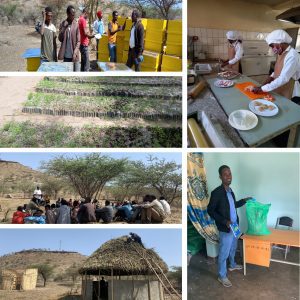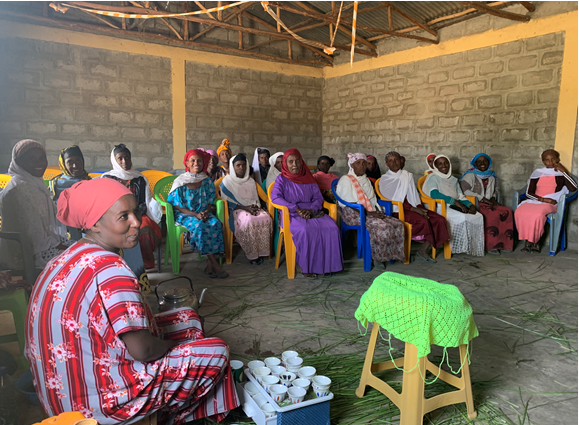In the prolonged project in the Worja catchment area (Rift Valley) we are, together with IDH and Vocda, trying to achieve sustainable protection and utilization of the area. The area is communal land and the project aims to improve the livelihood of local residents as well as conserve the environment. Several initiatives have started after the kick-off of the project in March.
One of the initiatives is to develop eco-tourism activities because of its scenery and proximity to Lake Dembal and Batu town. The area is very suitable for wildlife viewing and migratory birds and easily accessible via the Batu-Butajera asphalt road that crosses the sites/mountain chains. Ecotourism has a dual purpose to protect the environment and generate additional income. Therefore, we trained 20 local community-members to run the newly constructed eco-tourism center. In cultural huts, visitors can now enjoy local drinks and food before walking the trails and enjoying the views. The training was provided in two forms; theoretical training on ecotourism by invited experts from ATJK Woreda Tourism Office and the practical training by Haile Resort experts.
Another example is the Income Generating Activity-groups where groups of local women are taught Business Development Skills. For instance, the Biftu Baha-group where 20 women have decided to produce and sell aloe vera and moringa soaps. Beekeeping is also stimulated. 50 modern beehives were handed over after a technical training was given to the beneficiaries.
Soil and water conservation is now organized by the local community. To support them, we distributed 80 pickaxes and 80 shovels. At the beginning of the upcoming rainy season, 1600 kg of improved maize seeds will be given to local farmers to increase the yield of fodder production. And 50.000 seedlings were sown (Moringa, Leusiniya and Sesbania amongst others) at the nursery site in Adamitulu Jido Kombolcha Woreda with collaboration of the ATJK Woreda Agriculture and Natural resource office.
Lastly, bylaws are drafted, making sure that by the end of this project, the community can take full responsibility of all activities in a sustainable way. We are happy to see that so much progress has been made for the 350 beneficiaries of this project that focusses on a wide variety of initiatives.

